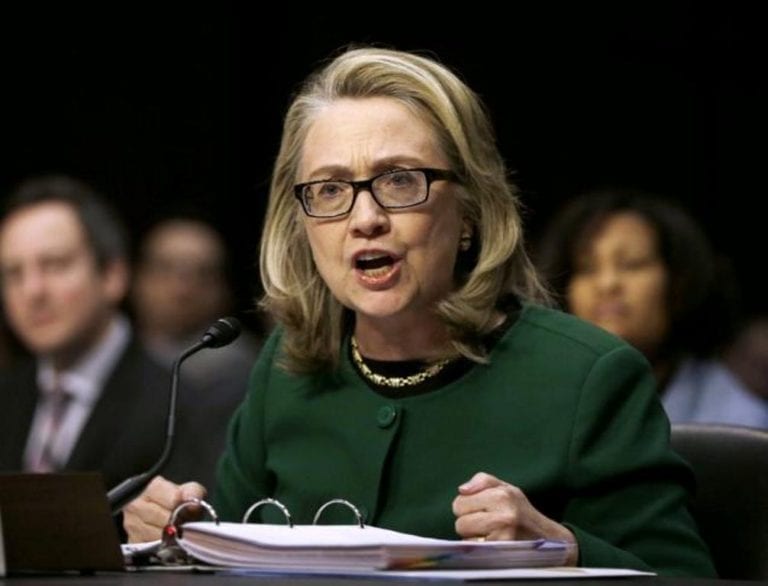

Judicial Watch Seeks Hillary Clinton Testimony


Submits Proposed Witness List, Discovery Plan to Federal Court
(Washington, DC) – Judicial Watch announced today that it has filed a proposed order for discovery with a federal court that seeks the testimony of Hillary Clinton about her use of non-state.gov email account(s) for official State Department business. Judicial Watch’s discovery plan also seeks the testimony of Cheryl Mills, Clinton’s former chief of staff; and Jacob “Jake” Sullivan, former senior advisor and deputy chief of staff, as well as other current and former State Department officials. Judicial Watch proposes the testimony take place over 12 weeks.
Today’s filing comes in a July 2014 Freedom of Information (FOIA) lawsuit seeking records and communications in the Secretary’s Office related to the since discredited talking points used by then-U.N. Ambassador Susan Rice to describe the nature of the September 11, 2012 Benghazi attack (Judicial Watch v. U.S. Department of State (No. 1:14-cv-01242)).
Clinton’s proposed testimony would cover the search in response to Judicial Watch’s FOIA request and, according to the filing:
- searches of the Office of the Secretary for emails relating to the September 12, 2012 Benghazi attack and its aftermath, including searches for the Accountability Review Board, congressional inquiries, other FOIA requests, and the preparation of Secretary Clinton’s testimony before Congress on January 23, 2013;
- the State Department’s policies, practices, procedures and/or actions (or lack thereof) to secure, inventory, and/or account for all records, including emails, of Secretary Clinton, prior to [her] termination of employment with the State Department; and
- the use of non-state.gov email account(s) to conduct official State Department business by Secretary Clinton and other officials and staff in the Office of the Secretary;
Judicial Watch’s other proposed witnesses include:
- Cheryl Mills
- Jacob Sullivan
- Lauren Jiloty, former special assistant to Clinton
- Monica Hanley, former Clinton aide
- Clarence Finney, State Department records management official
- 30(b)(6) witness(es) (designated State Department witness(es) who testify on behalf of the agency)
Judicial Watch also seeks documents about the State Department’s Benghazi document responses and the handling of non-State.gov emails of Clinton and other top State officials, in particular:
- All documents that concern or relate to the processing of any and all searches of the Office of the Secretary for emails relating to the September 11, 2012 Benghazi attack and its aftermath, including but not limited to:
- searches for records for the Accountability Review Board;
- searches in response to congressional inquiries (including requests from the House Committee on Oversight and Government Reform dated September 20, 2012, October 2, 2012, October 29, 2012, and November 1, 2012);
- searches in preparation of Secretary Clinton’s testimony before Congress on January 23, 2013; and
- searches in response to FOIA requests, including but not limited to the FOIA request submitted by Plaintiff in this case.
Such documents would include the tasking, tracking and reporting records for such searches. Forms DS-1748 and any “search slips,” “search tasker,” “search details,” shall also be considered responsive.
- All communications that concern or relate to the processing of all searches referenced in Document Request No. 1 above, including directions or guidance about how and where to conduct the searches, whether and how to search Secretary Clinton’s email, and issues, problems, or questions concerning the searches and/or search results.
- All records that concern or relate to the State Department’s policies, practices, procedures and/or actions (or lack thereof) to secure, inventory, and/or account for all records, including emails, of Secretary Clinton, Cheryl Mills, Huma Abedin and Jacob Sullivan prior to their termination of employment with the State Department.
U.S. District Court Judge Royce Lamberth ruled on March 29 that “where there is evidence of government wrong-doing and bad faith, as here, limited discovery is appropriate, even though it is exceedingly rare in FOIA cases.”
In a separate Judicial Watch lawsuit, U.S. District Court Judge Emmett Sullivan noted in his May 4, 2016, order that “based on information learned during discovery, the deposition of Mrs. Clinton may be necessary.” Judge Sullivan’s order also authorized that Judicial Watch can take the testimony of Cheryl Mills, Huma Abedin, Bryan Pagliano, Patrick Kennedy and other State Department witnesses.
“Mrs. Clinton’s testimony will help the courts determine whether her email practices thwarted the Freedom of Information Act,” said Tom Fitton, Judicial Watch president.
For full case history on the Benghazi talking points lawsuit, click here.
###















